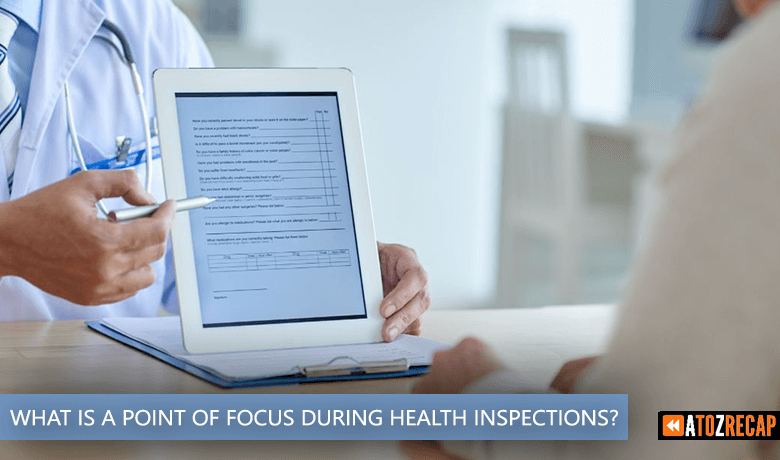What is a Point of Focus During Health Inspections?
Health inspections are pivotal checkpoints in the realm of food safety, serving to uphold public health standards and ensure compliance with regulations within food establishments. These inspections entail a comprehensive assessment of various facets, targeting specific areas to mitigate health risks and safeguard consumer well-being.
Food Safety Practices
Assessing Food Handling and Storage Procedures: One of the primary focuses of health inspections is evaluating food handling and storage practices within establishments. Inspectors meticulously examine the processes involved in handling, storing, and preparing food to ensure compliance with safety standards and minimize the risk of contamination.
Ensuring Cleanliness in Food Preparation Areas
Inspectors also pay close attention to the cleanliness of food preparation areas. They scrutinize hygiene protocols, sanitation practices, and the maintenance of food contact surfaces to prevent the spread of pathogens and maintain a hygienic environment conducive to safe food handling.
Hygiene and Sanitation Standards
Emphasizing Hygiene Protocols and Sanitation Practices: Hygiene and sanitation standards are paramount in maintaining food safety. Inspectors assess the implementation of hygiene protocols, including handwashing procedures, use of gloves, and sanitation practices among staff members. Proper adherence to these protocols is essential to prevent cross-contamination and ensure consumer safety.
Maintaining Clean Food Contact Surfaces
Inspectors also focus on the cleanliness of food contact surfaces such as countertops, cutting boards, and utensils. They ensure that these surfaces are sanitized effectively to minimize the risk of microbial contamination and maintain the integrity of food products throughout the preparation process.
Temperature Control Measures
Monitoring Refrigeration and Hot-Holding Equipment: Temperature control is critical in preventing bacterial growth and preserving the quality of perishable foods. Inspectors closely monitor refrigeration units, freezers, and hot-holding equipment to ensure that they maintain proper temperatures as per regulatory guidelines. Proper temperature control helps mitigate the risk of foodborne illness and ensures consumer safety.
Preventing Bacterial Growth Through Temperature Regulation
Maintaining appropriate temperatures in storage and holding areas is essential to prevent bacterial proliferation. Inspectors verify temperature logs and assess compliance with temperature regulations to safeguard against foodborne pathogens and maintain the freshness and safety of food products.
Employee Practices
Observing Proper Food Handling Techniques: Employee practices play a crucial role in maintaining food safety standards. Inspectors observe food handling techniques, including proper storage, preparation, and serving practices, to ensure that employees adhere to established protocols and minimize the risk of contamination.
Promoting Hygienic Practices Among Staff Members
Promoting a culture of hygiene and safety among staff members is imperative in food establishments. Inspectors emphasize the importance of regular training and education on food safety practices to instill a sense of responsibility and accountability among employees.
Pest Control Measures
Evaluating Pest Management Strategies: Effective pest control is essential to prevent infestations and protect food products from contamination. Inspectors evaluate pest management strategies and assess the effectiveness of measures implemented to control pests such as rodents, insects, and other vermin.
Preventing Infestations to Safeguard Food Integrity
Maintaining a pest-free environment is paramount to safeguarding the integrity of food products. Inspectors identify potential vulnerabilities and recommend preventive measures to minimize the risk of infestations, ensuring the safety and quality of food served to consumers.
Facility Maintenance
Assessing the Cleanliness and Condition of Facilities: The cleanliness and maintenance of facilities are critical factors in ensuring food safety. Inspectors assess the condition of floors, walls, ceilings, and ventilation systems to identify areas that may pose sanitation risks or compromise food safety standards.
Ensuring Adequate Ventilation and Sanitary Environments
Adequate ventilation is essential to prevent the buildup of contaminants and maintain air quality within food establishments. Inspectors ensure that ventilation systems are properly maintained and functioning effectively to create a sanitary environment conducive to safe food preparation and storage.
Compliance with Regulations
Verifying Adherence to Local Health Codes and Regulations: Compliance with local health codes and regulations is non-negotiable when it comes to food safety. Inspectors verify adherence to regulatory standards, including proper labeling, storage, and handling of food products, to ensure that establishments operate in accordance with legal requirements.
Consequences of Non-Compliance and the Importance of Regulatory Adherence
Non-compliance with health regulations can have serious consequences, including fines, citations, and even closure orders. Inspectors underscore the importance of regulatory adherence and work closely with establishments to address any violations and implement corrective actions to mitigate risks and ensure compliance.
Conclusion
In conclusion, health inspections play a crucial role in maintaining food safety standards and safeguarding public health. By focusing on key areas such as food handling practices, hygiene standards, temperature control measures, pest management strategies, facility maintenance, and regulatory compliance, inspectors help uphold the integrity of the food supply chain and protect consumers from foodborne illnesses. Through vigilant monitoring, enforcement, and collaboration with food establishments, health inspections contribute to the promotion of a safe and healthy dining experience for all.

